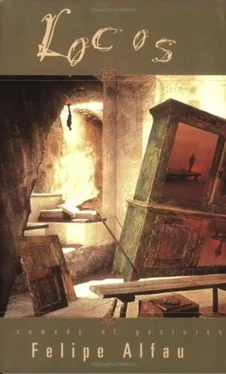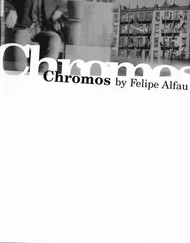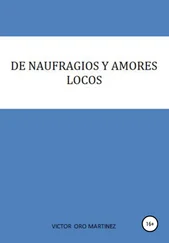Don Gil pressed him, possessed of savage cruelty against the man from China:
“I suppose you would hesitate in such a case. Well, let me tell you that there is no use hesitating about a verdict when you can base it on fingerprints. I would not hesitate, I would tell the man from China. ”
Don Benito was already conquered. As a true Prefect, persistence and not reasoning had a way of conquering him. He felt that fingerprints were an enormous contribution, if not to justice, at least to those who administer it. He felt that fingerprints would in a case of doubt ease the conscience completely, relieve it of the burden of discrimination. Don Benito could shrink no further. His brother-in-law was bending over him, gesticulating like a fearful personification of divine justice, shouting in his face, pointing an accusing finger as if he saw in him the man from China. Don Benito could only murmur:
“I don’t see in what capacity you would mingle in the affairs of that man from China.”
But Don Gil knew that he had already won and utterly disregarded this last worthless objection, which, after all, had no bearing upon the matter.
“Benito, come over to the house Wednesday night; you know we always play cards Wednesday nights. Padre Inocencio will be there. You and he have something in common. You threaten faults with jail, he threatens them with hell.” Don Gil laughed as his mind formed a series of comparisons which he considered both deep and satirical. “Besides, Felisa says that for a brother you come to see her very seldom.”
“She knows as well as you how busy I am. Really, Gil, sometimes I don’t leave the office until twelve and one o’clock at night. But tell her that I will do my best to be there Wednesday.”
Don Gil thrust his hand in his pocket very slowly and Don Benito made a magnanimous gesture:
“Don’t bother. I will pay the café.”
This was a ritual which always took place when the Prefect and his brother-in-law went to a café together and Don Gil followed it up with another ritual:
“By the way, Benito. ”
“How much do you need, Gil?”
“Twenty-five pesetas will do. You know it is a case. ”
“Don’t explain, please, Gil, such a trifle,” and Don Benito took out his wallet and delivered the twenty-five pesetas as one who drops them into a bottomless well.
“Thanks, Benito; I will give them back to you on Wednesday.”
“If you don’t lose them at cards before I get there.”
“Now, you know we only play with garbanzos . “
They both laughed and departed.
On his way home Don Gil bought a newspaper. He looked through it quickly. Toward the back he found his article, the last of a series in which he proved the legitimacy of his father’s discovery, its importance and infallibility. It was the last article. Now he was ready to collect them and publish them in book form, together with his father’s monograph. He felt sure that Benito would lend him the money to pay the publishers. He had not talked and argued and convinced all that afternoon in vain. After all, this time the money would be for the cause. Benito had lent him money so many times for things that could not compare with this one! This time it was for the cause, for the great cause of his life. His father had never been recognized, but now it would be different. The name Bejarano would stand out. The Bejaranos would be an important family in Spain. He could not allow his father’s memory to die out in obscurity. Spain had produced too many forgotten glories, too many unrecognized geniuses. He would not let his father go to join the Perals and Losadas in oblivion. Don Gil banked everything on the publication of his book entitled Fingerprints which, as he had often said, was a simple, short, snappy title that went home. If only his father had had his modern ideas he wouldn’t have been so long unrecognized. Don Gil was now sure that the Prefect would lend him the money. He caressed the twenty-five pesetas in his pocket. Yes, he had lent him this money without explanations; why should he not lend him money for the great cause, for a thing that would make him proud to have a sister married to a Bejarano? And Don Gil decided that he had already given too much thought to the matter and began to read the last article of his series, entitled: Fingerprints, a sure antidote against all alibis .
On Wednesday night Don Gil was at home. He lived with his wife, Felisa, and four children: two boys, Gaston and Pepe; and two girls, Mignon and Carmen. Now, Don Gil abhorred anything that sounded French. As a real patriot he used no reasoning for his dislike — he hated the French simply for being French. His wife, on the other hand, entertained a sincere admiration for the neighbors across the Pyrenees, but as a true woman she used no more reasoning for her preference. She simply loved the French for being French.
This disparity of opinions formed the basis of most of their arguments and had cast the few clouds which had speckled the otherwise limpid sky of their married life. When their first child was born they argued long about what name to use and at the end it was agreed that the children’s names should be chosen alternatively by both (Madame Bejarano did not imitate the French in everything). Felisa, being the woman, had the first choice. The first child was a boy, then two girls were born and then another boy. In this way the foregoing names resulted. Felisa chose two names which sounded delightfully French to her. Don Gil picked out two regular Spanish names. But thereafter Don Gil always had a way of saying: “Felisa, your son Gaston or your daughter Mignon has done such and such a thing.” And his wife never overlooked saying: “Gil, your daughter Carmen, or that son of yours Pepe, has done such and such a thing.” And there was always a latent jealousy concerning the education of the children which luckily never overleapt the humorous limits until the time when Uncle Benito, who also disliked the French, offered to send Pepe (El Españolito, as they called him) to school in England. This created a serious family dispute which for years was always brought up whenever there was the slightest disagreement.
On Wednesday night Don Gil was at home. He was sitting at the camilla with two other guests, one of them a priest, Padre Inocencio, and Felisa. They were playing cards as Don Gil had anticipated. Now and then Don Gil stooped and lifting the cover of the camilla , stirred the brasero:
“These winters of Madrid are getting more and more treacherous.”
“The hill of January, as they call this part of the year, is always bad. There is that breeze from the Guadarrama, which will not put out a candle but can kill a man.”
“Those are only superstitions; nothing like the old newspaper under the shirt to defy all the breezes from all the Guadarramas.”
Don Gil straightened up.
“There, now, when it comes to that, there is nothing like the classic Spanish cloak which, unfortunately, is becoming less and less popular in these days of foreign invasion. The Spanish cloak creates a warm atmosphere about the body that. ”
“We have heard that a thousand times, Gil. Let’s attend to the game,” interrupted Felisa.
They played silently for a while. Padre Inocencio picked some winnings and mused absent-mindedly:
“Yes, these winters of Madrid are getting worse. ”
“Padre Inocencio, you are winning as usual.”
“The Lord protects the innocent, my daughter.”
“Who deals next?”
“My turn.” The other man was gathering the cards and began to shuffle them.
“Have you read my last article in La Gaceta ?’’
“Yes, I did. It seems to me rather fatalistic, don’t you think?”
(The voice of Carmen was heard from the next room smothered in manly laughter.)[4]
Читать дальше












